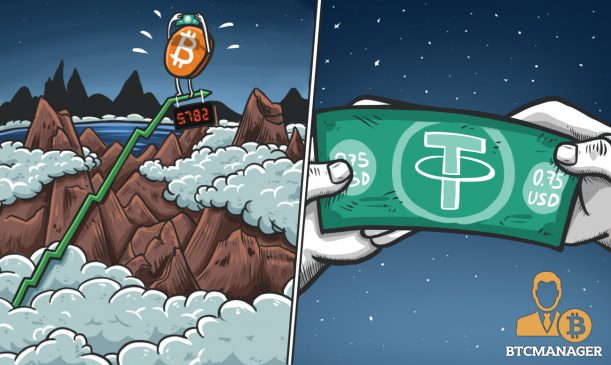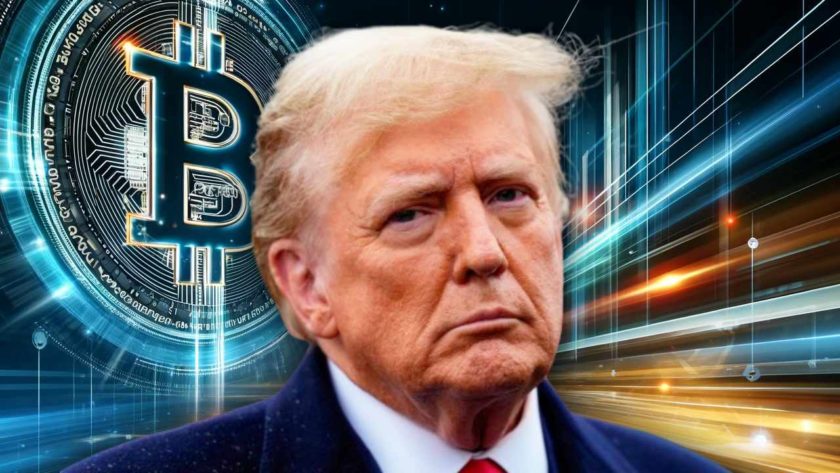The price of bitcoin rallied by over nine percent week-on-week despite the revelations that market-leading stablecoin USDT is not fully backed by US dollars as we were made to believe. On Sunday evening, BTC/USD traded at $5,785.
The Big Stories
At the start of last week, Tether finally admitted to what the market has rumored for years. A company lawyer stated that the stablecoin tether (USDT) is not backed one-to-one by dollars in a bank account. Only 74 percent of tether in circulation is actually backed by US dollars. Given that the majority of bitcoin trading volumes are in the BTC/USDT trading pair, this news came as an initial shock to the market, which reacted with a sharp drop on the day. However, Bitcoin quickly recovered to continue its multi-week rally.
Even the news of Bitfinex-linked company Crypto Capital’s Reggie Fowler was arrested in relation to the Bitfinex/Tether vs the NYAG saga did not stop Bitcoin’s journey towards the $6,000 mark.
On the positive news front, Fidelity Digital Assets published a survey that has found that over a fifth of institutional investors have some exposure to digital assets, signaling a general openness and acceptance of cryptoassets as an asset class that will not go away.
Unlike bitcoin, the altcoin market closed with a mix of green and red last week, with the likes of BCH, DASH, and XMR outperforming, gaining ten, seven, and seven percent respectively while the likes of XLM, ADA, TRX and BSV lost between one and three percent each.
This week’s contributions were provided by Aisshwarya Tiwari, Ashwath Balakrishnan, and Eddie Mitchell.
The United States Department of Justice has moved the District Court of Arizona to stay a detention memorandum against Crypto Capital and Reginald Fowler concerning the ongoing case against Bitfinex.
On May 2, 2019, BTCManager reported that a businessman named Reginald Fowler was linked to Bitfinex via an HSBC account and allowing the exchange to use it as a means of customer withdrawals and deposits. In an unexpected move, the state department has moved to restrict the movement of Reginald Fowler by detaining him.
The state department cited serious flight risk and perceived economic danger of Fowler as the reason for detention. Fowler is being charged with bank fraud, conspiracy to commit bank fraud, and operation of an unlicensed money transmitting business. The crimes are based on findings that Fowler was running a shadow bank on behalf of Bitfinex and other unnamed cryptocurrency exchanges.
The Attorney General of Arizona, Elizabeth A. Strange, points to the strength of evidence and nature of the offense as reasons to warrant immediate arrest.
The state of New York indicted Fowler on April 11, 2019. The above-listed indictments underlined five bank accounts as specific evidence. On April 30, 2019, Fowler was finally arrested in Chandler, Arizona after the Supreme Court ruled in favor of the state of New York.
Also, Crypto Capital is said to have advertised this scheme as being licensed and in full compliance with American law despite no license being issued. Crypto Capital isn’t even registered as a money services business in any jurisdiction of the United States of America.
Asset management firm Fidelity Investments on May 2, 2019, published a Medium post which suggests that almost 22 percent of institutional investors hold digital assets in some form in their portfolios.
There’s no doubt that if crypto assets are to see the light of mainstream adoption the floodgates of institutional money must be opened, and while several crypto-based financial products and assets have managed to pique the interest of big players, there still exists a lot of ground left to be covered. Thankfully, this might not be the case for long as a recent survey conducted by Fidelity Investments posits that institutional money could pour in heaps in the digital currency space.
The research notes that high net-worth investors are “overwhelmingly favorable” about the appealing qualities of digital assets. According to the survey, almost seven in ten respondents said that specific characteristics of digital assets are attractive. This appeal, however, could be in different forms for different investors.
For instance, 47 percent of respondents think that the technological innovation behind digital assets is their most attractive aspect. Similarly, about 46 percent find crypto-assets’ low correlation with traditional financial assets their redeeming point. The survey found that about 74 percent of financial advisors and 80 percent of family offices view digital assets in a favorable light.
Notably, 25 percent of respondents opined that digital assets’ decentralized nature is what makes them a hot cake among the large money powerhouses.
Facebook is actively seeking collaborators and funding for its cryptocurrency venture, now known to be “Project Libra,” which is more commonly referred to as FacebookCoin. This according to the Wall Street Journal (WSJ), and Gizmodo, May 02, 2019.
According to sources close to the matter at WSJ, Facebook has been seeking “dozens of financial firms and online merchants” to aid in the launch of the much talked about project, which it aims to tie into its already staggeringly popular social media platform.
Simply put, Project Libra is a mission akin to that of Amazon’s credit card or Apple’s latest announcement to do the same. It’s a bid to connect their already highly-established services and products with their customer’s finances, which already poses many challenges considering that Facebook is looking to achieve the same end with a cryptocurrency.
Many websites now offer the simplistic option to sign-up or sign-in to their platforms using a Facebook ID. With this, the scope of application for the rumored FacebookCoin is gigantic, especially considering that the platform already boasts 1.56 billion daily logins internationally, and 2.38 billion monthly active users.
As per WSJ, Facebook is seeking around $1 billion in funding and has reportedly spoken with Visa, Mastercard and First Data Corp., indicative of Facebook’s intentions to create an easy to access and fluid financial tool. Most interestingly, according to WSJ, this funding would provide the backing for a cryptocurrency, suggesting a stablecoin is in the making.
Justin Sun, CEO of Tron, announced the foundation had released a developer guide for Tron, April 30, 2019. In reality, the ‘guide’ was just a list of exchanges on which Tron (TRX) is listed.
TRON released a ‘developer guide’ which turned out to be nothing more than a list of exchanges. After a few hours of leaving it up, it was deleted from their Medium blog. A Reddit user managed to archive the blog post before it was deleted. TRON has been in the news time and time again for controversies surrounding Justin Sun. Earlier this year, he botched a Tesla giveaway by choosing a bunch of bots. When a real person won the giveaway, Justin didn’t stand by the promise and give the winner a Tesla.
Since then, TRON has uploaded an actual developer guide. This guide outlines how to set up TRON Quickstart and integrate it with TRON web libraries.
TRON recently launched Tether (USDT) on their blockchain to facilitate transfers backed by a stablecoin. Whilst USDT is minted on the TRON blockchain, TRON needs permission from the main Tether treasury to print any more. With all of the issues plaguing Tether, it seems like a poor partnership move from the TRON foundation.
Thailand’s Securities and Exchange Commission (SEC) has amended the Securities and Exchange Act of 2019 to allow market players to participate in primary markets to trade digital securities. This according to a report by the Bangkok Post published May 2, 2019.
In its quest to digitize the nuts and bolts of capital markets, Thailand’s SEC has tweaked the Securities and Exchange Act 2019 to introduce digital trading using blockchain technology. The use of blockchain technology will help the country’s booming financial sector to execute transactions in a more secure, rapid, and transparent manner.
Further, the amendments made to the Act also expand the coverage scope of scripless transactions beyond secondary markets to primary markets. For the uninitiated, scripless trading is basically a trading system where settlement is carried out through book-entries rather than by the movement of physical securities.
Under the changes made to the Act, entrepreneurs can now choose to raise funds via security token offerings (STOs), a funding method that has gained a lot of traction in recent times due to its several perceived benefits over initial coin offerings (ICOs).
Speaking to the Bangkok Post, SEC deputy secretary, Tipsuda Thavaramara said:
“This change will have a major impact as the amended Act provides a legal basis to support [the country’s capital market] the tokenization platform. The law also opens opportunities for additional market players and supports the idea of entirely digital shares.”
Like BTCMANAGER? Send us a tip!
Our Bitcoin Address: 3AbQrAyRsdM5NX5BQh8qWYePEpGjCYLCy4




